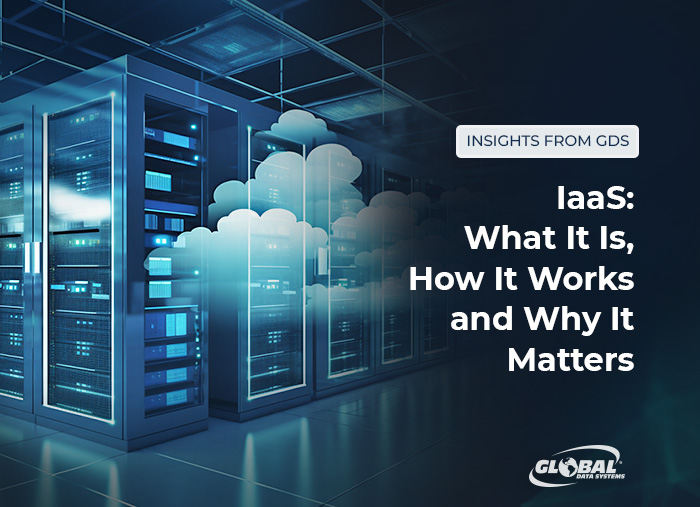IaaS: What It Is, How It Works and Why It Matters
Businesses need technology, but not many need to own it. That’s the beauty of the Infrastructure-as-a-Service (IaaS) model — it enables companies to access the robust technologies they need without taking on any of the capital costs, maintenance expenses or obsolescence risks that are part and parcel of in-house IT infrastructure.

IaaS is a cloud computing model in which customers access on-demand virtualized computing resources over the Internet. Businesses simply rent IT infrastructure from cloud providers on a pay-as-you-go basis.
The ability to provide scalable and cost-effective access to essential IT resources without the burden of managing physical infrastructure makes IaaS an incredibly attractive option. In a recent 451 Research survey of IT decision-makers in 14 countries, 82 percent said they currently use IaaS to host their workloads, with the majority reporting they use as many as 10 different providers.
How IaaS Works
In the IaaS (infrastructure as service model), cloud service providers (CSPs) are responsible for maintaining the physical data centers, ensuring they are secure, reliable and properly equipped. In addition to maintaining all hardware and networking infrastructure, CSPs implement infrastructure-level security measures such as firewalls, encryption and access controls to protect customer data and resources. Customers, meanwhile, are responsible for backup and other data protection tasks, including application and data security.
IaaS is a cloud computing model in which customers access on-demand virtualized computing resources over the Internet.
Customers also have a great deal of freedom to customize the IaaS environment. They can create and manage virtual machines (VMs) tailored to their specific needs, choosing the operating systems and applications of their choice and adjusting the amount of compute, memory and storage to match application performance needs. Customers can also create custom virtual networks and define subnets to isolate and secure sensitive resources.
Major Benefits of IaaS Infrastructure as a Service
Cost efficiency is among the most significant benefits of IaaS. As noted earlier, it eliminates substantial upfront capital expenditures and ongoing maintenance costs by shifting infrastructure costs to a pay-as-you-go operating expense model. This gives organizations more budget flexibility and provides some tax benefits as well. Operating expenses can be fully deducted in the year they are incurred, reducing the income tax burden for the year while also boosting the amount of cash on hand for other important initiatives.
Other benefits include:
- Customers can provision resources within minutes instead of waiting days for a new on-prem server to be deployed.
- Businesses can rapidly scale up or down their IT resources to meet fluctuating demand, ensuring optimal performance and cost management.
- IaaS providers invest heavily in robust and redundant infrastructure, enabling them to offer uptime guarantees that would be difficult to achieve with on-premises infrastructure.
- Businesses can leverage IaaS data centers worldwide to deploy resources closer to their target audiences.
Use Cases of IaaS
IaaS is commonly used in development and testing environments, where developers can quickly provision and scale the resources needed to test applications. The ability to simultaneously run multiple test environments makes it possible to test an app across various operating systems, browsers and hardware configurations. This is essential for ensuring compatibility and functionality across a wide range of user devices and setups.
Other use cases include:
- Web hosting. IaaS makes it simple to scale resources up or down based on web traffic and application demands.
- Disaster recovery. Customers can replicate systems and data in the cloud, making it accessible in case of data loss or hardware failures. IaaS providers often offer data replication and backup services for added redundancy.
- IaaS offers the computational power and storage capacity required for big data processing and analytics.
- Machine learning and artificial intelligence. Customers can set up distributed computing clusters to process large ML and AI training workloads in parallel.
GDS Can Help You Unlock the Potential of IaaS Service for Your Business
Infrastructure-as-a-Service (IaaS) offers businesses a scalable and cost-effective solution to their IT infrastructure needs. With GDS, you can harness the full potential of IaaS services to optimize your operations and achieve your IT goals. Discover the power of IaaS with GDS and see how our expertise can make a difference for your organization.
Benefits of Managed IT Services from Global Data Systems
- Strategic Managed IT: We help you solve your technology related business problems.
- Connectivity: We get you reliable, secure connectivity anywhere in the western hemisphere in 48 hours.
- Support: When you need help simply call our 24x7x365 support number.
- Billing: Instead of managing hundreds of vendors - get one, easy to read bill from GDS.
Contact Managed Services Provider, Global Data Systems >
